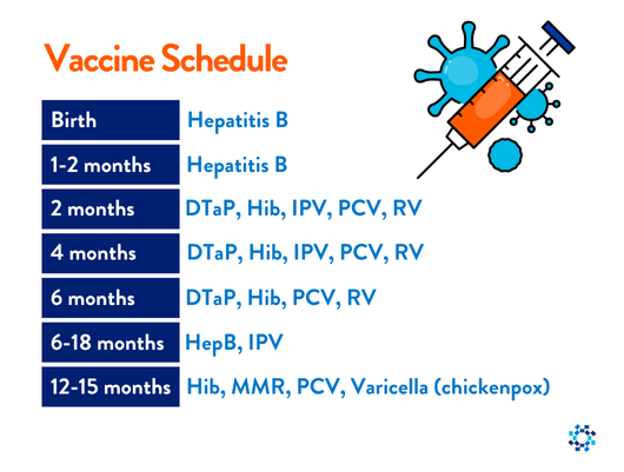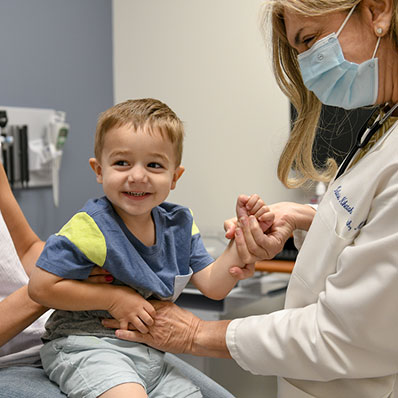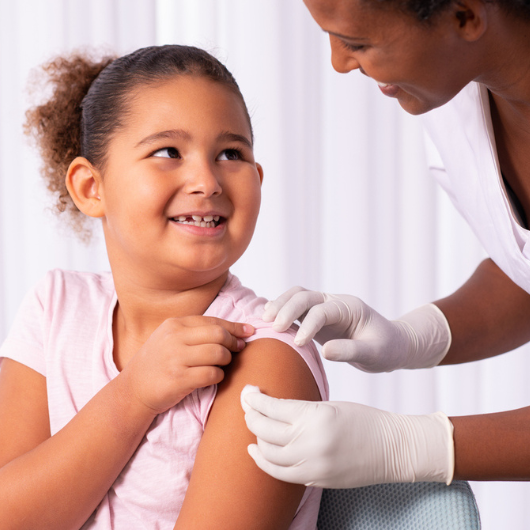The Childhood Vaccine Schedule: Why It Matters

July 03, 2025
Protecting our children from preventable diseases is a top priority for every parent. Vaccines are one of the most powerful tools we have to achieve this, and the recommended childhood vaccine schedule provides a roadmap for giving children the best protection at the right times.
Moses F. Olorunnisola, M.D., a pediatrician with Hackensack Meridian Medical Group in Forked River, helps us explore why early vaccination is crucial, how the schedule is developed. and what to expect before and after your child's appointments.
Child Vaccination Schedule
Doctors recommend following the childhood vaccine schedule from the Centers for Disease Control and Prevention (CDC). This schedule is designed to give kids the best protection at the right times.

Why vaccinate early?
You've just welcomed your tiny, fragile newborn into the world, and the thought of giving them a shot might seem daunting. But that's precisely why vaccines are so important. A baby's immune system is still developing and can't fully fight off diseases on its own. Vaccines provide crucial support, helping them build the defenses they need.
"I get asked, ‘Why are we injecting my baby’s little immune system with all these things?’” says Dr. Olorunnisola. “The short answer is their immune system is not developed yet; so if your child gets sick at that age, the likelihood of them having a severe infection is high.”
Babies have some antibodies from their mothers, but this protection fades over time. The vaccine schedule helps babies build their own "immune army" as they grow and are exposed to more germs.
A flexible approach
Doctors understand that parents have questions and concerns.
"When a parent tells me ‘I don’t want to do all these vaccines for my child today,’ I’m not going to say, ‘You need to do it this way or else,’” says Dr. Olorunnisola. “But I am going to provide them information on what I know works, and this childhood vaccine schedule has been designed and studied over the years to offer maximum protection from diseases.”
Science and improvement
The vaccine schedule isn't set in stone. It changes as scientists learn more and vaccines improve.
- Combined shots: Some vaccines that used to require separate shots are now combined into one, meaning fewer needles.
- Amazing bodies: Even with combined shots, a child's body can still build immunity to each disease. It's like training different parts of the immune army at the same time.
Getting Ready for Vaccine Day: Tips for Parents and Kids
Here's how to prepare your child (and yourself) for vaccinations:
Before the appointment
- Don't pretreat: Resist the urge to give pain relievers like acetaminophen before the shot. This can actually make the vaccine less effective.
"That actually lowers immune response to the vaccine, when you want your child to be able to build a bigger, stronger defense," explains Dr. Olorunnisola.
After the appointment
- Ice pack: If the injection site is sore, an ice pack can help.
- Fever: A low-grade fever is normal. If your child seems comfortable, you don't need to treat it. If they're uncomfortable, talk to your doctor.
“If your child develops a fever but they’re still comfortable, let it ride,” Dr. Olorunnisola says, “and if not, you and your pediatrician can treat that on an individual basis.”
For Nervous Parents
It's okay to feel nervous. Here's what you can do:
- Talk to your doctor: Your pediatrician is your best resource for information and support.
- Read the CDC vaccine information statement: This helpful resource explains the benefits and risks of each vaccine. You can find it online or at your doctor's office. Reviewing the facts can help calm any nerves.
- Identify your fears: What specifically are you worried about? Understanding your fears can help you address them.
A Doctor's Perspective
"I see what a lot of these diseases have done to kids, so the last thing I want is for your child to be sick from a disease that could’ve been prevented," says Dr. Olorunnisola. "I have kids of my own, and I’m not going to offer something to your child that I don’t believe in."
Remember, doctors want what's best for your child. They're here to answer your questions and help you make informed decisions.
Next Steps & Resources:
- Meet our source: Moses F. Olorunnisola, M.D.
- To make an appointment and discuss vaccines with a pediatrician near you, call 800-822-8905 or visit our website.
- Learn more about Hackensack Meridian Children’s Health.
- Find more information on parent vaccine decision making.
- Watch our podcast on Navigating the Noise on Pediatric Vaccines.
The material provided through HealthU is intended to be used as general information only and should not replace the advice of your physician. Always consult your physician for individual care.







